英语教学法教程unit12的重难点
- 格式:doc
- 大小:28.50 KB
- 文档页数:2
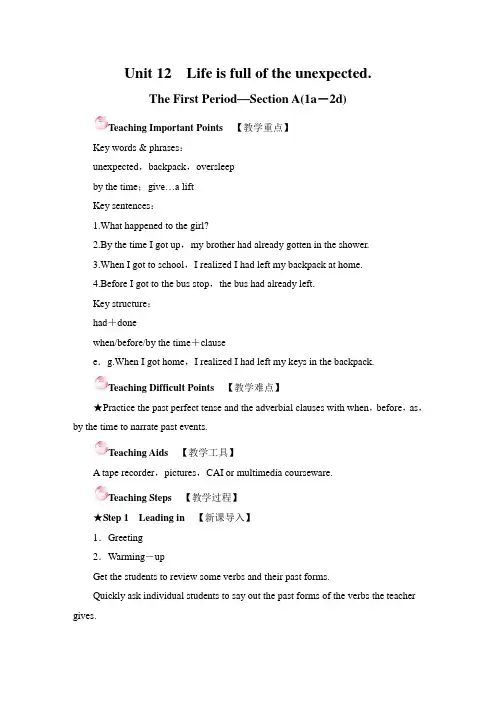
Unit 12Life is full of the unexpected.The First Period—Section A(1a-2d)Teaching Important Points【教学重点】Key words & phrases:unexpected,backpack,oversleepby the time;give…a liftKey sentences:1.What happened to the girl?2.By the time I got up,my brother had already gotten in the shower.3.When I got to school,I realized I had left my backpack at home.4.Before I got to the bus stop,the bus had already left.Key structure:had+donewhen/before/by the time+clausee.g.When I got home,I realized I had left my keys in the backpack.Teaching Difficult Points【教学难点】★Practice the past perfect tense and the adverbial clauses with when,before,as,by the time to narrate past events.Teaching Aids【教学工具】A tape recorder,pictures,CAI or multimedia courseware.Teaching Steps【教学过程】★Step 1Leading in【新课导入】1.Greeting2.Warming-upGet the students to review some verbs and their past forms.Quickly ask individual students to say out the past forms of the verbs the teacher gives.★Step 2Cooperative inquiry【合作探究】1.Finish the task in 1a①Show the pictures in 1a.Get the students to say the phrases to express the situations of the pictures.get up late,take a shower,run/hurry to…,miss the bus,left the schoolbag at home②Read these phrases and write them down.The teacher asks about the pictures.Did the girl have a good or bad day?Then discuss in pairs,asking:What happened to the girl?Get the students to answer with complete sentences,using the phrases.2.Finish the task in 1b①Read the instructions.Get the students to focus on the verb forms in the recording.②Play the recording for the first time.Students listen and try to fill in the blanks.③Play the recording a second time.Listen and check their answers.④Get the students to focus on the sentences.Teach the past perfect tense.Write the structure:had+done.3.Finish the task in 1c①Read aloud the sentences.Then read the model conversation in 1c.②Show pictures in turn and get the students to talk about what happened to Mary.Take turns to play the role of Mary.4.Finish the tasks in 2a-2b①Show PPT or pictures.Ask questions:Where is Mary in the pictures?Is anything good or bad happening to her?What is it about?②Play the recording for the first time.Number the pictures in 2a.And ask some students to say their answers.③Read the sentences in 2b.Play the recording again.Students listen and complete the sentences.④Play the tape once more.Check the answers with the whole class.Read aloud the sentences.Then students listen and repeat.5.Finish the task in 2c①Read and role-play the conversation.Then get students to retell the story about Mary.②Students tell the end of the story.First discuss in groups and then share in class.6.Finish the task in 2d①Talk about the picture and guess the conversation.Ask:What can you see in the picture?Can you guess what the dialogue is about?②Ask the students to read aloud the conversation in 2d.Then role-play it in pairs.③The teacher removes the verbs or verb phrases in the dialogue.Play the recording and get the students to fill in the blanks.④Check the answers with individual students.Write and learn these items:go off,woke up,rushed out,eat breakfast,brush my teeth,wash my face,got to,gave mea lift⑤Play the recording and get the students to follow the teacher in the recording.Then role-play the conversation.★Step 3Homework1.Retell the story about Mary's morning.2.Write the events in the five pictures in 1a.3.Translate the following sentences into English.(1)你发生了什么事?_________________________________________________________________(2)今天早晨我到学校时,迟到了10分钟。
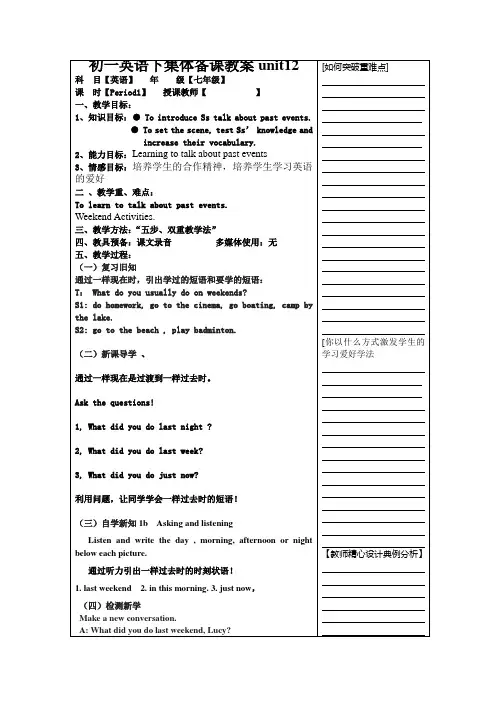
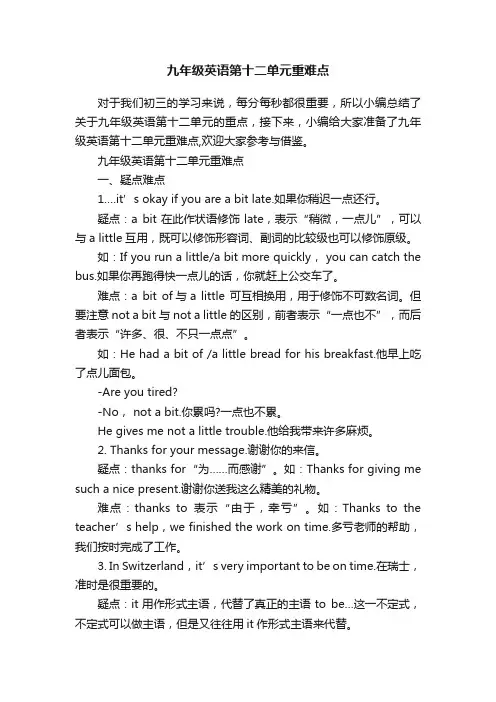
九年级英语第十二单元重难点对于我们初三的学习来说,每分每秒都很重要,所以小编总结了关于九年级英语第十二单元的重点,接下来,小编给大家准备了九年级英语第十二单元重难点,欢迎大家参考与借鉴。
九年级英语第十二单元重难点一、疑点难点1….it’s okay if you are a bit late.如果你稍迟一点还行。
疑点:a bit在此作状语修饰late,表示“稍微,一点儿”,可以与a little互用,既可以修饰形容词、副词的比较级也可以修饰原级。
如:If you run a little/a bit more quickly, you can catch the bus.如果你再跑得快一点儿的话,你就赶上公交车了。
难点:a bit of与a little 可互相换用,用于修饰不可数名词。
但要注意not a bit与not a little的区别,前者表示“一点也不”,而后者表示“许多、很、不只一点点”。
如:He had a bit of /a little bread for his breakfast.他早上吃了点儿面包。
-Are you tired?-No, not a bit.你累吗?一点也不累。
He gives me not a little trouble.他给我带来许多麻烦。
2. Thanks for your message.谢谢你的来信。
疑点:thanks for“为……而感谢”。
如:Thanks for giving me such a nice present.谢谢你送我这么精美的礼物。
难点:thanks to表示“由于,幸亏”。
如:Thanks to the teacher’s help,we finished the work on time.多亏老师的帮助,我们按时完成了工作。
3. In Switzerland,it’s very important to be on time.在瑞士,准时是很重要的。
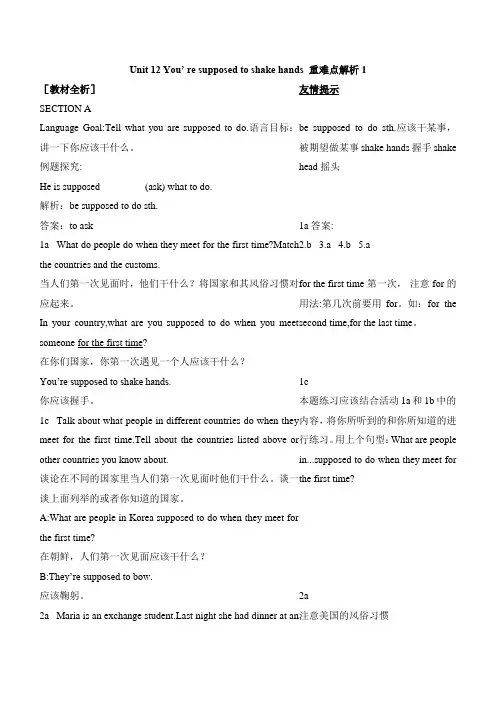
Unit 12 You’ re supposed to shake hands 重难点解析1[教材全析] 友情提示 SECTION ALanguage Goal:Tell what you are supposed to do.语言目标: 讲一下你应该干什么。
例题探究:He is supposed ________ (ask) what to do. 解析:be supposed to do sth. 答案:to ask1a What do people do when they meet for the first time?Match the countries and the customs.当人们第一次见面时,他们干什么?将国家和其风俗习惯对应起来。
In your country,what are you supposed to do when you meet someone for the first time?在你们国家,你第一次遇见一个人应该干什么? You’re supposed to shake hands. 你应该握手。
1c Talk about what people in different countries do when they meet for the first time.Tell about the countries listed above or other countries you know about.谈论在不同的国家里当人们第一次见面时他们干什么。
谈一谈上面列举的或者你知道的国家。
A:What are people in Korea supposed to do when they meet for the first time?在朝鲜,人们第一次见面应该干什么? B:They’re supposed to bow. 应该鞠躬。
2a Maria is an exchange st night she had dinner at anbe supposed to do sth.应该干某事, 被期望做某事shake hands 握手shake head 摇头 1a 答案:2.b3.a4.b5.afor the first time 第一次, 注意for 的用法:第几次前要用for 。
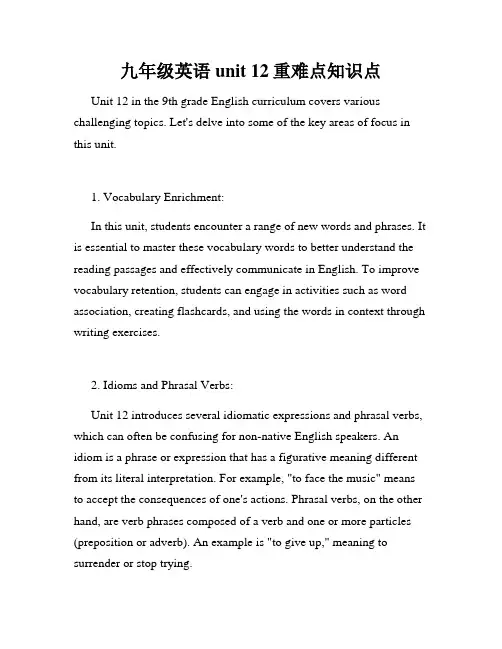
九年级英语unit 12重难点知识点Unit 12 in the 9th grade English curriculum covers various challenging topics. Let's delve into some of the key areas of focus in this unit.1. Vocabulary Enrichment:In this unit, students encounter a range of new words and phrases. It is essential to master these vocabulary words to better understand the reading passages and effectively communicate in English. To improve vocabulary retention, students can engage in activities such as word association, creating flashcards, and using the words in context through writing exercises.2. Idioms and Phrasal Verbs:Unit 12 introduces several idiomatic expressions and phrasal verbs, which can often be confusing for non-native English speakers. An idiom is a phrase or expression that has a figurative meaning different from its literal interpretation. For example, "to face the music" means to accept the consequences of one's actions. Phrasal verbs, on the other hand, are verb phrases composed of a verb and one or more particles (preposition or adverb). An example is "to give up," meaning to surrender or stop trying.3. Verb Tenses:Verbs play a crucial role in English grammar. Throughout Unit 12, verb tenses are emphasized. Students must understand the proper usage of different verb tenses, such as the present simple, present perfect, past simple, and past perfect. Practice exercises involving verb tenses and their application in various sentence structures will reinforce learning and improve accuracy.4. Modal Verbs:Unit 12 also covers modal verbs, which are used to express ability, possibility, permission, and obligation. Common modal verbs include "can," "could," "may," "might," "must," "shall," "should," "will," "would," and "ought to." Understanding when and how to use these modal verbs correctly is crucial to construct meaningful sentences and convey the intended message accurately.5. Conditional Sentences:Conditional sentences express hypothetical situations and their potential consequences. They consist of an "if" clause and a main clause. Unit 12 introduces different types of conditionals, such as the zero conditional, the first conditional, the second conditional, and the third conditional. Each conditional form serves a specific purpose andunderstanding their usage will enable students to effectively communicate possibilities, probabilities, and counterfactual situations.6. Reading Comprehension:Unit 12 includes reading passages that test students' comprehension skills. These texts cover a wide range of topics, from scientific discoveries to historical events. Students must develop strategies to comprehend the main ideas, infer meanings from context, extract details, and make logical connections within the text. Active reading techniques such as highlighting, underlining, and summarizing can be beneficial in improving reading comprehension.7. Writing Skills:In the writing component of Unit 12, students are encouraged to enhance their skills in organizing and expressing ideas. Students should practice writing different types of essays, including descriptive, narrative, and argumentative essays. Emphasis should be placed on developing a coherent structure with relevant supporting details, using appropriate vocabulary and grammar, and editing for clarity and conciseness.As students progress through the unit, focusing on these key areas will help them gain a deeper understanding of the English language.Continuous practice, both in and outside the classroom, is essential for students to consolidate their knowledge and improve their English proficiency. Remember, perseverance and consistent effort are the keys to success in mastering English skills.。
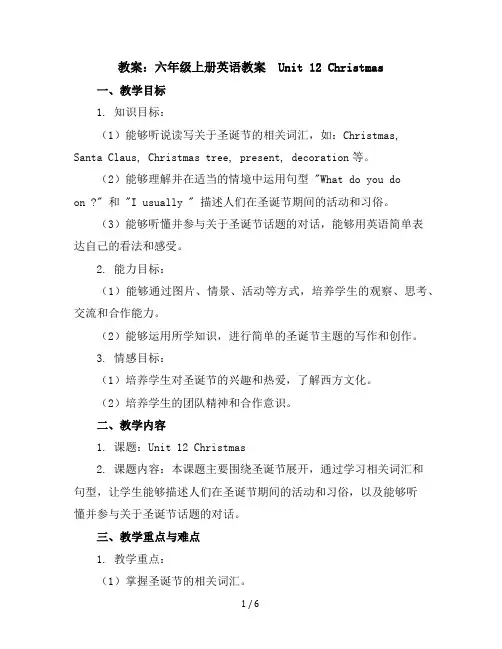
教案:六年级上册英语教案 Unit 12 Christmas一、教学目标1. 知识目标:(1)能够听说读写关于圣诞节的相关词汇,如:Christmas, Santa Claus, Christmas tree, present, decoration等。
(2)能够理解并在适当的情境中运用句型 "What do you doon ?" 和 "I usually " 描述人们在圣诞节期间的活动和习俗。
(3)能够听懂并参与关于圣诞节话题的对话,能够用英语简单表达自己的看法和感受。
2. 能力目标:(1)能够通过图片、情景、活动等方式,培养学生的观察、思考、交流和合作能力。
(2)能够运用所学知识,进行简单的圣诞节主题的写作和创作。
3. 情感目标:(1)培养学生对圣诞节的兴趣和热爱,了解西方文化。
(2)培养学生的团队精神和合作意识。
二、教学内容1. 课题:Unit 12 Christmas2. 课题内容:本课题主要围绕圣诞节展开,通过学习相关词汇和句型,让学生能够描述人们在圣诞节期间的活动和习俗,以及能够听懂并参与关于圣诞节话题的对话。
三、教学重点与难点1. 教学重点:(1)掌握圣诞节的相关词汇。
(2)能够运用句型 "What do you do on ?" 和 "I usually " 描述人们在圣诞节期间的活动和习俗。
(3)听懂并参与关于圣诞节话题的对话。
2. 教学难点:(1)词汇的掌握和运用。
(2)句型的灵活运用。
四、教具与学具准备1. 教具:PPT、圣诞树装饰品、圣诞礼物等。
2. 学具:课本、练习本、文具等。
五、教学过程1. 导入:(1)利用PPT展示圣诞节的图片,引导学生谈论圣诞节的习俗和活动。
(2)引导学生复习已学的关于节日的话题,为新课的学习做好铺垫。
2. 呈现:(1)教师展示课本中的插图,引导学生观察并讨论图中的情景。
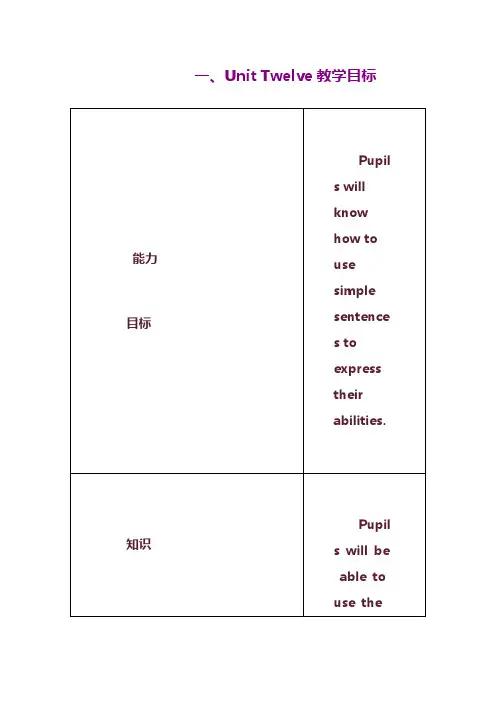
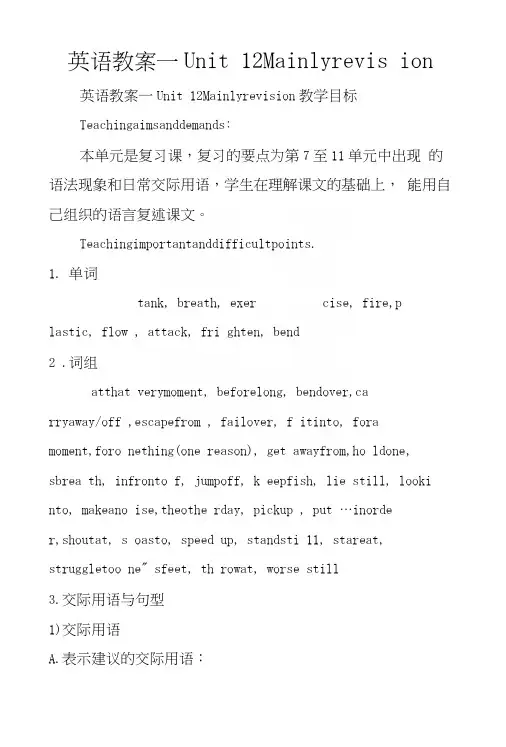
英语教案一Unit 12Mainlyrevis ion 英语教案一Unit 12Mainlyrevision教学目标Teachingaimsanddemands:本单元是复习课,复习的要点为第7至11单元中出现的语法现象和日常交际用语,学生在理解课文的基础上,能用自己组织的语言复述课文。
Teachingimportantanddifficultpoints.1.单词tank, breath, exer cise, fire,p lastic, flow , attack, fri ghten, bend2 .词组atthat verymoment, beforelong, bendover,carryaway/off ,escapefrom , failover, f itinto, fora moment,foro nething(one reason), get awayfrom,ho ldone,sbrea th, infronto f, jumpoff, k eepfish, lie still, looki nto, makeano ise,theothe rday, pickup , put …inorder,shoutat, s oasto, speed up, standsti 11, stareat, struggletoo ne" sfeet, th rowat, worse still3.交际用语与句型1)交际用语A.表示建议的交际用语:Isuggest (t hat) youdost h・Youshould dos th.Youou ghttodosth・Youneedtodo sth・B.复习经七至十一单元出现过的日常交际用语。
2)句型Weneedtofi ndoneabout3 Ocentimetre s(cm)by30cm by50cm.Fo ronethingth eykeepthewa terclean.Thoughtsrus hedthroughh erhead.4.语法复习第七至十一单元出现过的重点语法项目。
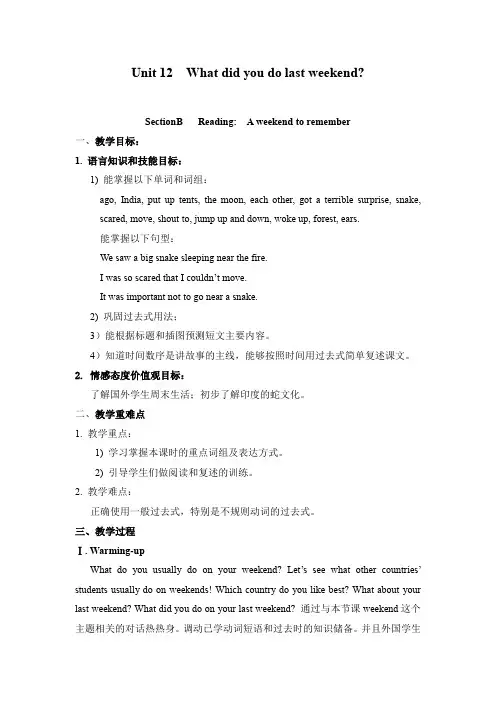
Unit 12 What did you do last weekend?SectionB Reading: A weekend to remember一、教学目标:1. 语言知识和技能目标:1) 能掌握以下单词和词组:ago, India, put up tents, the moon, each other, got a terrible surprise, snake, scared, move, shout to, jump up and down, woke up, forest, ears.能掌握以下句型:We saw a big snake sleeping near the fire.I was so scared that I couldn’t move.It was important not to go near a snake.2) 巩固过去式用法;3)能根据标题和插图预测短文主要内容。
4)知道时间数序是讲故事的主线,能够按照时间用过去式简单复述课文。
2. 情感态度价值观目标:了解国外学生周末生活;初步了解印度的蛇文化。
二、教学重难点1. 教学重点:1) 学习掌握本课时的重点词组及表达方式。
2) 引导学生们做阅读和复述的训练。
2. 教学难点:正确使用一般过去式,特别是不规则动词的过去式。
三、教学过程Ⅰ. Warming-upWhat do you usually do on your weekend? Let’s see what other countries’ students usually do on weekends! Which country do you like best? What about your last weekend? What did you do on your last weekend? 通过与本节课weekend这个主题相关的对话热热身。
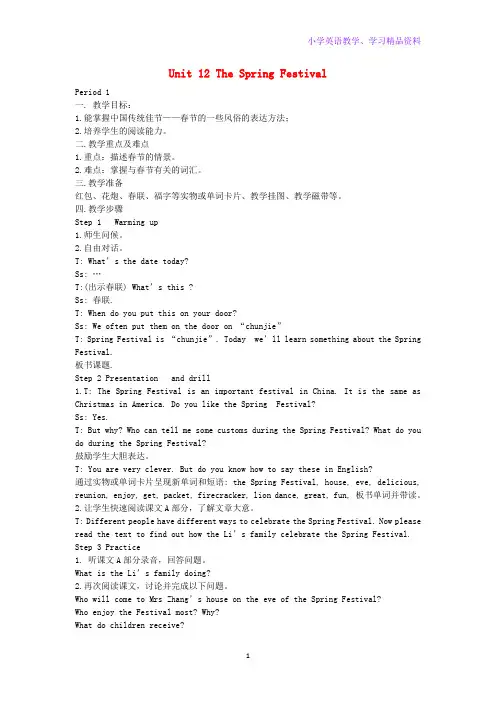
Unit 12 The Spring FestivalPeriod 1一. 教学目标:1.能掌握中国传统佳节——春节的一些风俗的表达方法;2.培养学生的阅读能力。
二.教学重点及难点1.重点:描述春节的情景。
2.难点:掌握与春节有关的词汇。
三.教学准备红包、花炮、春联、福字等实物或单词卡片、教学挂图、教学磁带等。
四.教学步骤Step 1 Warming up1.师生问候。
2.自由对话。
T: What’s the date today?Ss: …T:(出示春联) What’s this ?Ss: 春联.T: When do you put this on your door?Ss: We often put them on the door on “chunjie”T: Sprin g Festival is “chunjie”. Today we’ll learn something about the Spring Festival.板书课题.Step 2 Presentation and drill1.T: The Spring Festival is an important festival in China. It is the same as Christmas in America. Do you like the Spring Festival?Ss: Yes.T: But why? Who can tell me some customs during the Spring Festival? What do you do during the Spring Festival?鼓励学生大胆表达。
T: You are very clever. But do you know how to say these in English?通过实物或单词卡片呈现新单词和短语: the Spring Festival, house, eve, delicious, reunion, enjoy, get, packet, firecracker, lion dance, great, fun, 板书单词并带读。
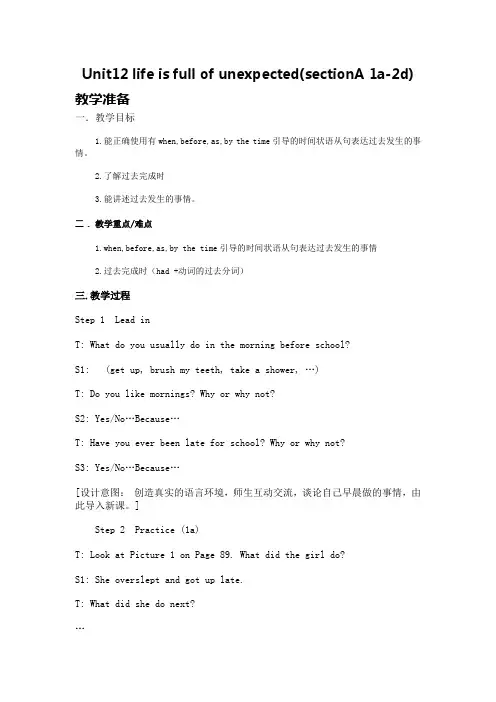
Unit12 life is full of unexpected(sectionA 1a-2d) 教学准备一.教学目标1.能正确使用有when,before,as,by the time引导的时间状语从句表达过去发生的事情。
2.了解过去完成时3.能讲述过去发生的事情。
二.教学重点/难点1.when,before,as,by the time引导的时间状语从句表达过去发生的事情2.过去完成时(had +动词的过去分词)三.教学过程Step 1 Lead inT: What do you usually do in the morning before school?S1: (get up, brush my teeth, take a shower, …)T: Do you like mornings? Why or why not?S2: Yes/No…Because…T: Have you ever been late for school? Why or why not?S3: Yes/No…Because…[设计意图:创造真实的语言环境,师生互动交流,谈论自己早晨做的事情,由此导入新课。
]Step 2 Practice (1a)T: Look at Picture 1 on Page 89. What did the girl do?S1: She overslept and got up late.T: What did she do next?…Get the students to talk about Mary's morning in groups and then report to the whole class.[答案] 1.She woke up late.2.She wanted to use the bathroom but someone was in the bathroom.3.She ran to catch the bus.4.The bus had already left.5.She got to school and realized she had left her backpack at home.[设计意图:呈现不同的图片,通过小组讨论有关Mary的清晨活动内容,锻炼口语表达能力。
Unit 12 My favorite subject is science. 一、 [话题](Topic) school subjects 二、[重点词组](Key Phrases) 1. favorite subject 2. on Friday 3. at weekend 4. P.E 5. at school (in the school) 6. music teacher 7. Chinese history 8. make sure 9. after class 三、[交际用语] 1. -What’s your favorite subject ? -My favorite subject is Chinese . 2. -What’s her favorite subject ? -Her favorite subject is English . 3. -Why do you like English ? -Because it’s interesting and useful . 4. -Why does he like P.E.? -Because he likes sports very much . 5. -Who is your math teacher ? -Mrs O’Sullivan. 四、[重点难点释义](Language Points) 1.What's your favorite subject?你最喜欢什么科目? favorite adj.特别喜爱的,如: a favorite song 一首喜爱的歌, his favorite daughter 他最疼爱的女儿, my favorite lesson 我最喜欢的功课。 注:favorite与like汉语均有“喜爱”的意思,但他们的词性不同,在句子中所处的位置也不同。试比较: He likes playing football very much.他非常喜欢踢足球。(like在主语后作谓语) Football is his favorite sport.足球是他喜爱的运动。(favorite在名词前作定语) 句中favorite本身就含有“最”的意思。因此,它没有比较等级。类似的问 题有What's your favorite food/drink?回答时就说:My favorite food/drink is...很喜爱like...very much like...a lot. 2.It's Tuesday,November 11.今天是11月11日,星期二。 句中的It通常用来指代时间日期,询问星期通常用“What day is today?”。英语中表示星期名称的单词,第一个字母应大写,且都以-day结尾。按西方风俗,一周的第一天为星期天“Sunday”,而不是星期一“Monday”。英语中表示月份名称的单词,第一个字母都应大写,且前面不加冠词。在表达日期概念时通常先写月后写日,且日多用序数词来表达,即在基数词后面加上th。但并不是所有的基数词变序数词都在后面加th,请记住下面的顺口溜: 1,2,3特殊记,8去t,9减e,ve变f再加th,遇y变ie再加th。 3.—Why do you like P.E.?你为何喜欢体育课? —Because it's fun.因为它有趣。 (1)疑问词why用来提问原因,往往用表示原因的because从句回答。如: —Why are you late for work?你今天为什么上班迟到了? —Because the traffic is too bad.因为交通太糟糕了。 because因为,是一个连词,它的后面必须是一个从句。如: He doesn't go to school today because he is ill. 今天他没来上学,因为他病了。 (2)fun作形容词,译为“有趣的,愉快的”(美)。如: You are great fun.你真有趣。 We have a fun holiday.我们假日过得很愉快。 fun还可作名词(不可数),译为“玩笑,娱乐,嬉戏”或“有趣,有趣的人或事(此时不加a)”。如: Playing computer games is great fun.玩电子游戏很有趣。 (3)P.E.= physical education 体育课。 4.After class I have volleyball for two hours.课后我打两个小时的排球。 (1)after class“课后”。注意class前不加冠词。 (2)此处“have”表示“从事,进行(由后接的名词所表示的动作)”, 如: have a swim 游泳 have a walk 散步 have 的应用很广泛,在不同的场合有不同的意思,可译为“有、吃、喝、开、举行、上”等。如: I have a child.我有一个孩子。 have breakfast/lunch/supper 吃早饭/午饭/晚饭 have a cup of tea 喝杯茶 have some fruit 吃些水果 have a meeting 开会 have a sports meeting 开运动会 have a party 举行一个晚会 have sports 进行体育活动 have a look 看一看 have to 不得不 (3)for后加表示时间的名词,译为“„„之久”表示一段时间。如: We have a talk for ten minutes.我们谈了十分钟。
英语教学法教程unit12 Teaching Writing 重点与难点
一.填空题。
1. Ss are motivated by________ writing tasks that have some ______ elements.
2. EFL writing tasks lack _______ .EFL writing tasks focus on the _______ rather than process.
3.Writing activities can be “writing for ______ ”,“writing for______ ”and somewhere between.
二.判断题。
1.()Brown summarises the features of process writing .
2. ( ) There are three major differences between EFL writing with
writing in reality.
3.( ) Morgan said that“writing can be less threatening for anxious
students as it gives them time to think about their meaning and
purpose.
4. ( ) Editing may take two forms: peer editing and teacher-editing.
5. ( ) The main procedure s of process writing include creating a
motivation to write, brainstorming, mapping , freewriting,
outlining, editing, revising, proofreading and conferencing.
6. ( ) Brainstorming help ss organize the generated ideas ,by using
a diagram or an outline.
7. ( ) Guidance for peer editing and for self-editing.
8.()Teaching are encourage to do independent proofreading.
9. ( ) During the conferencing , Ts need to encourage rather than
criticize ,be destructive rather than constructive and try
their best to protect ss self-esteem.
10.( ) It is believed that the way to motivated ss to write is key
to point to the successful teaching of writing.
三.名词解释。
1. Editing:
2. Brainstorming:
3. Revising:
4. Conferencing:
5. Mapping :。